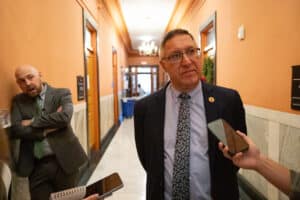
Senate Ways and Means Chairman Michael Rodrigues talks to reporters in a State House hallway Wednesday, Jan. 3, 2024 while legislative director Jeremy Spittle (left) listens in. Photo by Sam Doran | State House News Service
Lawmakers are on the eve of kicking off the traditionally busier second year of their two-year session, and the top House Democrat suggested a need for “fiscal prudence” that could color debate on a host of policy priorities during this election year.
House Speaker Ron Mariano, who alongside Senate President Karen Spilka has engineered major increases in state spending, signaled concern Tuesday about the state’s financial footing amid a period of lackluster tax revenues, exploding emergency shelter costs and the implementation of long-awaited but costly tax relief.
“On health care and other significant issues, the House is committed to addressing a number of pressing challenges during the second year of this legislative session, all while emphasizing a focus on fiscal prudence,” Mariano said in a statement.
Business leaders recently implored the state to pump the brakes on new spending after years of surging tax collections and free-flowing outlays, warning that “the drastic increase in government spending over the past five years is a growing concern for our future competitiveness and may detrimentally impact the long-term fiscal health of Massachusetts.”
Beacon Hill power players might now be hunkering down for a more fallow period of tight margins and difficult decisions.
Collections Short of Estimates, But Not of 2022 Haul
Tax collections and federal aid exploded during the pandemic, handing budget-writers massive surpluses, but the trend has trailed off. Revenues fell short of expectations in each of the first five months of fiscal year 2024, putting year-to-date collections about $627 million short of the estimates used to craft the annual state budget, but not actually lower than the same stretch last year despite Mariano’s reference to “declining tax revenues.”
Other wildcards could swing the pendulum back in the other direction, like a new voter-approved surtax on high earners to fund education and transportation, or inflict even more financial pressure on policymakers.
Mariano, who has served in the House for more than three decades and through several economic and budget swings, in October said he plans to run for reelection and another term as speaker, and Spilka told GBH News she intends to do the same.
In 2021, while Beacon Hill’s coffers were overflowing, Mariano said his “biggest problem” as speaker was “spending money.”
“Take a look around,” he said at the time, gesturing to portraits of House speakers. “None of these guys spent that much money. Maybe if you add up, take these walls over here and add up all the money they ever spent as speakers, they never spent as much as the Senate president and I have spent in this [American Rescue Plan Act] budget. So it is something to think about, it’s a pretty interesting little dynamic.”
The Healey administration expects record demand on the emergency shelter system will cost nearly $1 billion this year and next year.
The Senate budget chief didn’t jump on board Wednesday with the administration’s proposal to drain $700 million in one-time funds to cover expenses related to the overflowing emergency shelter system. Last month, Healey proposed covering funding deficiencies for a projected $932 million in emergency shelter funding by tapping into the Transitional Escrow Fund that former Gov. Charlie Baker set up in 2021 to stash surplus revenue.
Asked by reporters Wednesday about his opinion on the governor’s idea to use up the one-time funds, Senate Ways and Means Chair Michael Rodrigues responded that they would “talk about it.”
Another pressure point: It’s still not clear if Massachusetts will need to repay the federal government some or all of the $2.5 billion in erroneously spent unemployment aid.
Many Competing Priorities
If the unsteady footing morphs into a full budget crisis, it could consume the political oxygen – and dollars – needed for other priorities.
In a Threads post outlining her 2024 goals, Spilka said she wants to expand free community college and reform the early education and care sector. Both of those areas have already received significant state investment, and the reforms some Democrats have been weighing could require substantially more.
Legislative leaders over the years have shown less concern about borrowing money than spending it outright. A pair of wide-ranging bond bills Gov. Maura Healey filed, one seeking over $4 billion in much-needed housing construction funds and the other financing economic development initiatives, are likely to receive action in the coming months. In addition, transit experts expect the administration to try and begin efforts to transform parts of the MBTA’s commuter rail system into a more subway-like service this year.
Mariano and Spilka in recent years have driven spending to record levels, mostly with the support of former Republican Gov. Charlie Baker and Healey, a Democrat. The current $56 billion fiscal 2024 budget is about $8 billion or 16 percent larger than the spending plan for fiscal 2022, which was the first with Mariano wielding the gavel.
Business groups sounded the alarm in November about state expenditures increasing at “breakneck speed,” urging legislative leaders to limit their new spending growth to the inflation rate.
Healey must file her fiscal 2025 budget proposal by Jan. 24. The House usually unveils and debates its version of the spending plan in April, followed by the Senate in May. The state legislature typically misses its deadline to have a budget in place by July 1, and budget woes could test relations between House and Senate Democrats, who under Mariano and Spilka have a record of being slow to compromise.
Lawmakers have just a bit less than seven months to tackle all of their remaining controversial priorities for the two-year term before July 31, which legislative rules set as the final day for formal sessions.
In addition to early education and care reforms and free community college, Spilka said she remains interested in sending Healey a prescription drug cost control bill “that will save lives and help people in our state who desperately need lower costs for their medications.”
She will need help from the House to accomplish that goal. The Senate approved prescription drug legislation in November for the third session in a row. Neither of the previous two iterations received a vote in the House.
Mariano, meanwhile, suggested that his chamber could pursue multiple bills to tackle several pressure points in the health care industry.
“The entire health care system is still reeling from the effects of the pandemic: hospital emergency departments are still overflowing, providers ranging from primary care offices to entire acute care hospitals are facing closure, bankruptcy or consolidation, and health insurance is becoming increasingly unaffordable for the average Massachusetts family,” Mariano said. “The House will address these issues in separate, comprehensive legislation in the second year of the session.”
State House News Service staff writer Chris Lisinski contributed to this report.






